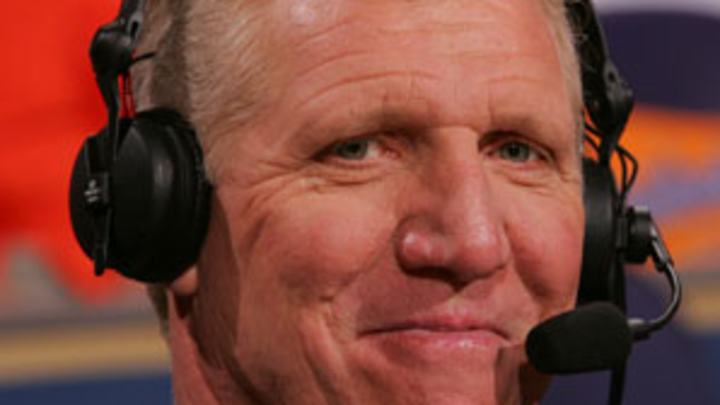Whether or not you liked him, Bill Walton had an art to announcing

Last week, Bill Walton announced he was retiring from broadcasting. He said his balky back was to blame -- no doubt the result of too many years of pretzeling his 6-foot-11 frame into spaces not meant for 6-11 frames.
The news came and went quietly. After all, Walton's presence on TV had diminished in recent years. Once the lead analyst for NBC and, later, ABC (and who can forget his short-lived reality series, "Bill Walton's Long Strange Trip"), he'd appeared only as a guest commentator the last couple years. Still, it's worth considering his impact.
Walton will be remembered for many things as an announcer, not the least of which was his tendency toward indefensible hyperbole. On any given night, any NBA player could be the league's best or worst, it seemed. His verbal repertoire was stocked with declaratives and light on modifiers -- there were rarely shades of gray in Walton's world, or even hints of it. I remember, as an undergrad in the early '90s, listening to him doing Clippers games and hearing him pronounce, on the basis of a particularly nice post move, that (and here I paraphrase) STANLEY ROBERTS IS GOING TO BE ONE OF THE TOP CENTERS IN NBA HISTORY! He was only off by a few hundred.
There were, of course, the catchphrases: "That's TURRRIBLE!" and "THROW IT DOWN BIG MAN!" There was the good-natured jibing with Stephen A. Smith and Snapper Jones. And there were the frequent references to John Wooden and the Grateful Dead.
Some people loved his shtick; others loathed it. I often found him grating -- and yet to my surprise I now miss him. Maybe it's that, in an era of snark and cool intellect and sarcasm, he was such an unabashed goofball. With Walton, even when he was in full-on-critique mode, you never took him totally seriously. It felt like everything he said was rooted in a love of the game, even when what he said was patently ridiculous.
An example: Early last year, I interviewed Walton for a column in SI that, for timing reasons, never ended up running. This was during the height of the (thankfully) now-waning era of what one might call Conviction Sports TV. Around the Horn was in full swing, Stephen A. was everywhere you looked and Skip Bayless was at his Skip Bayless-est. Every opinion was delivered at full volume and with absolute certitude. The conceit of my column was that, lacking this type of conviction myself, I would attempt to gain it by learning from the "masters." So, naturally, I approached Walton, for who could be a better mentor than the Earl of Emphasis himself?
I e-mailed to suggest noon for a phone interview. Wrote back Big Red: "12 noon est is BETTER THAN PERFECT." It was my first lesson: even perfection can be improved upon.
What's the key to being so authoritative, I asked.
"Well," Walton said, and then, for 13 glorious, uninterrupted minutes, he spoke. He stressed the importance of doing your homework, of telling the truth and being inspired by "the music" (Neil Young especially). Finally, he declared: "The challenge is telling the story in the shortest amount of time." As far as I could tell, he wasn't joking.
I noted that it's easy for him to summon authority, being a Hall of Fame NBA player. But was possible for someone like me?
Indeed it was, he said, so long as you prepare assiduously and filter out bad information. "Beware the bloviators who are pushing their own agenda because there are serious consequences for believing nonsense," he warned. "I'm the biggest believer in the endless battle of trying to conquer hype with substance."
Finally, in an attempt to see just how far his opinions ranged, I posed one final question. Bill, I asked, what should I eat for lunch: turkey or ham? In his response, I fully expected Walton to say something along the lines of "GO HAM OR GO HOME!" But on this one, he surprised me.
"Chris," he said, with ultimate gravity, "It's your lunch, your life, your choice."
Looking back now, the whole 25-minute interview was so outlandish and ideal for my (sarcastic) purposes that, like Bill's on-air persona, I remain unsure whether it was merely an act. But maybe, in the end, it didn't matter. Maybe that last quote -- the one about "your lunch, your life, your choice" -- gets at the core of Walton's appeal. As emphatic as he was, as declarative as he was, it never felt like Walton was trying to convince us that he was right. Instead, he saw himself as starting a conversation, as being the eternal devil's advocate. So many analysts seem as if they're dead-set on trying to convert us to their point of view, and affect scorn if anyone dares question their authority. For these men, their certitude is born of expertise but may also be rooted in insecurity, a feeling that they have to be right. Not Walton. All along, he assumed that we as viewers would arrive at our own convictions in the end. He was just there to spur us along.

Chris Ballard is a senior writer at Sports Illustrated, where he covers the NBA and specializes in long-form stories. Ballard, who joined SI in 2000, is the author of four books.